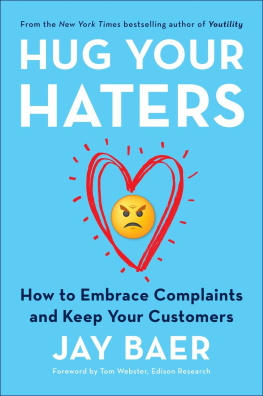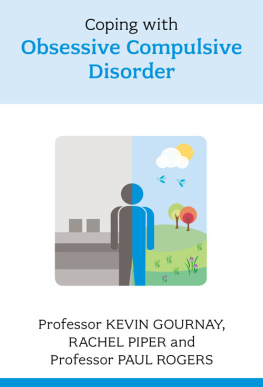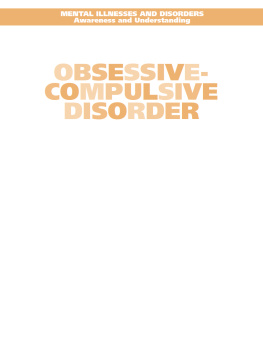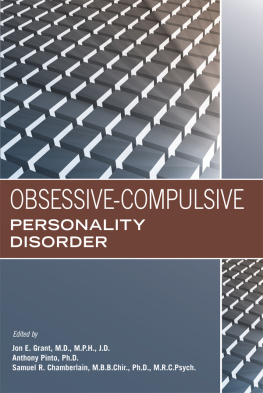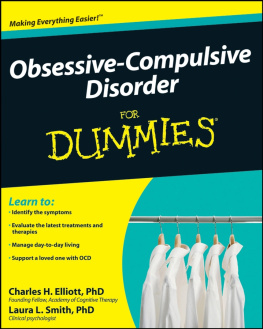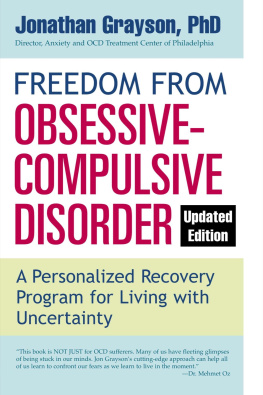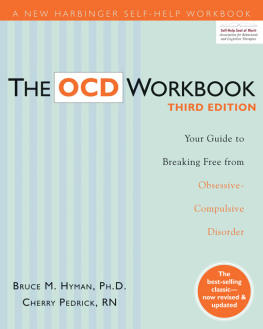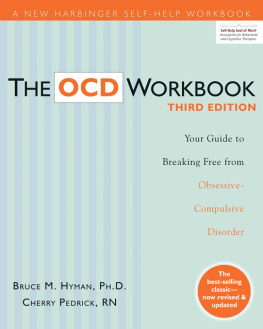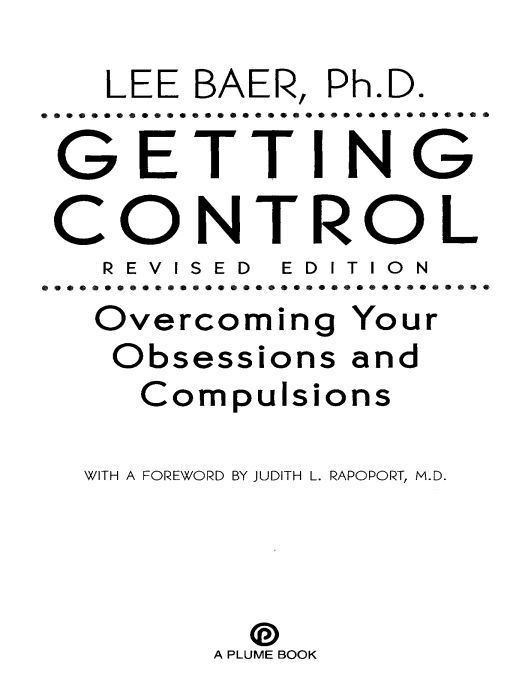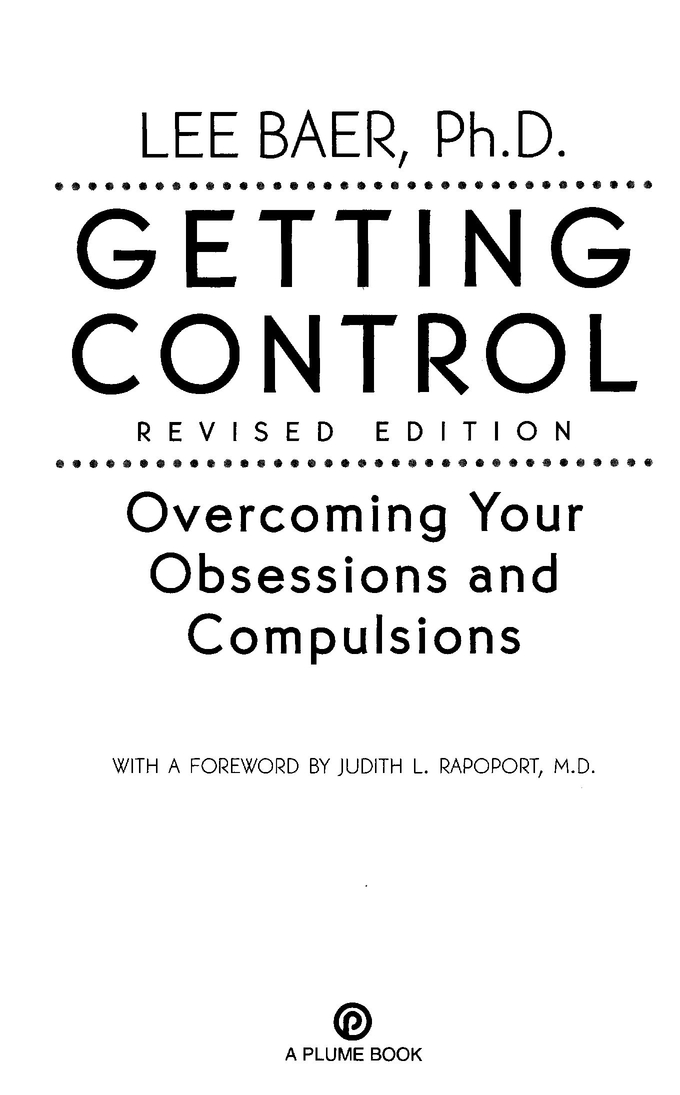Table of Contents
What makes Baers valuable work stand out, beyond its breadth of information, is sincerityand hopefulness.
Publishers Weekly
Obsessive-compulsive disorder wreaks havoc on the lives of six million Americans. Getting Control offers a clinically proven plan to treat OCD and help put an end to distressing symptoms. In Dr. Lee Baers completely revised and updated edition of his classic book OCD sufferers will discover how to:
*Assess symptoms
*Set realistic goals
*Create therapeutic exercises
Plus:
*Which medications really work
*Effective new treatments for violent and sexual obsessions
*The role audiotapes play in treating obsessive thoughts
... and much more
Lee Baer, Ph.D., is Associate Professor of Psychology in the Department of Psychiatry at Harvard Medical School, as well as Director of Research at the OCD Clinic at Massachusetts General Hospital and the OCD Institute at McLean Hospital. An internationally recognized expert in the treatment of OCD and related disorders, Dr. Baer is the author of more than a hundred scientific papers about OCD, and the co-editor of Obsessive-Compulsive Disorders: Theory and Management. He lives in Massachusetts with his family.
Judith L. Rapoport, M.D., is the author of The Boy Who Couldnt Stop Washing.
ALSO BY LEE BAER, PH.D.
The Imp of the Mind:
Exploring the Silent Epidemic of
Obsessive Bad Thoughts
To Carole Ann
FOREWORD
Dr. Baer has pulled together a most readable book for patients and their families on the diagnosis and treatment of obsessive-compulsive disorder. Unlike too many mental health practitioners, Dr. Baer does not indulge in polemics, but instead offers insights based on his unique wealth of experience in carrying out the behavioral treatment of OCD in a multidisciplinary clinic with large numbers of patients. Because of his important and unusual experience, and because interest in OCD is relatively new, this guide has a breadth and depth not to be found elsewhere. The case histories and informal style, together with the comprehensive material on both drug and behavior therapy, will allow patients and their families to make intelligent choices and initiate treatments with an ease that has not been possible before.
The section on the treatment of trichotillomania is a significant first. This disorder, whose victims are compelled to pull out their own hair (typically one strand at a time), affects millions and has been underrecognized and misunderstood. There is virtually no popular writing on this subject. Dr. Baer describes a number of cases and outlines the behavioral techniques that he has found useful in the treatment of this humiliating disorder.
Another important section of Getting Control is its discussion of behavioral treatment of children with OCD. Common sense tells us that children and adolescents should respond to the same techniques as do adults, and Dr. Baer provides some practical experience and advicehow to involve the parents, for examplein this relatively understudied area. And his experience indicates that behavior therapy may be just as effective for pediatric subjects as for adults.
Getting Control is a model for how-to books aimed at patients with any psychiatric disorder, but it is particularly welcome to sufferers of OCD, for whom so little is available.
Judith L. Rapoport, M.D.
Chief, Child Psychiatry Branch, National Institute
of Mental Health
Author of The Boy Who Couldnt Stop Washing
PREFACE
In this book you will learn how to get control of your obsessions and compulsions with behavior therapy. We now have two proven treatments for obsessive-compulsive disorder: behavior therapy and medication. Although powerful new medications for OCD have recently received considerable publicity, information about behavior therapy remains sorely lacking.
When newspaper articles or television segments about OCD mention behavior therapy, they usually ascribe it a role secondary to medications; as a result, it is rarely described in detail. This is especially unfortunate, since many OCD sufferers could use behavior therapy to gain control of their own compulsions and obsessions. I hope that this book will rectify this situation by empowering you to get control of your OCD symptoms.
For more than two decades we have known that behavior ther- apy is effective for OCD. But most people with the disorder still remain unaware of its existence. Recently I treated a woman with severe OCD who provided a sad illustration of this ironical situation. Her chief problem was that she could not throw anything away. In her house worthless newspapers and food wrappers, mixed with valuable documents and stock certificates, were knee-deep. She was crippled by these hoarding rituals and other obsessive thoughts about losing something important. She could no longer work, and by the time I was asked to see her, she had voluntarily hospitalized herself on an inpatient psychiatry ward. Despite almost a decade of psychiatric treatment, her symptoms continued to get worse. She had been told that sexual issues were the root of her problem, and had to be resolved before she could improve. After years of hearing this she had come to believe it, although there was no scientific evidence that it was true. Sadly, this woman had never been told about behavior therapy, a treatment that has now given her a chance for recovery.
Perhaps as unfortunate as those OCD sufferers who are unaware of behavior therapy are those who are misinformed about it. Some patients have heard that behavior therapy forces people to do things against their will. Or they have seen a TV piece featuring a patient being physically forced to touch the inside of a filthy trash barrel. Some people choose not to try behavior therapy because of these negative, authoritarian images. This book is designed to allay these fears by presenting behavior therapy techniques as a self-help approach, in which OCD sufferers control their rate of progress at each step.
Recently I and my colleagues Dr. Michael Jenike and Dr. William Minichiello set down in a textbook for doctors and other health professionals all the current knowledge about OCD. Getting Control is different; it is written for you, the OCD sufferer. The methods I describe in the following pages are based on my ten years of research on and clinical experience with behavior therapy as a means of controlling OCD symptoms.
This book is not intended as a substitute for behavior therapy or medication, and many readers will need professional help in dealing with their OCD symptoms. I have provided tests to help you assess the severity of your symptoms, as well as guidelines for seeking out behavior therapists and psychiatrists who specialize in treating OCD, if this seems necessary.
Most of you will find that if you work hard and follow the methods outlined in these pages, you should be rewarded with lasting decreases in your compulsions and obsessions; you also will have the feeling of accomplishment that comes from controlling your own problems.
Thanks are due to many colleagues, friends, teachers, associates, and family, without whom this book would not have been possible.
Many colleagues in the Psychiatry Department at Massachusetts General Hospital have provided a stimulating learning environment over the years, exemplified by our chief, Dr. Ned Cassem. Special thanks are due to my colleagues Drs. Michael Jenike and Bill Minichiello, who have been my teachers and friends over the last decade. Both also provided helpful suggestions on earlier drafts of this book. In addition, I am grateful to Drs. Joe Ricciardi, John Hurley, Nancy Keuthen, and Lynn Buttolph, also colleagues of mine.



